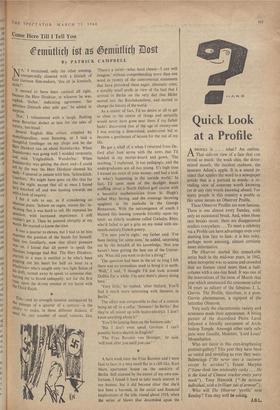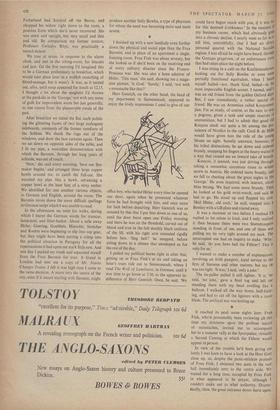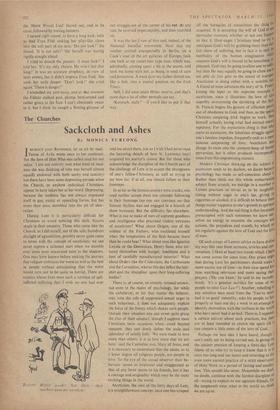eenuitliti) it a5 emiitlicb 11J ot
By PATRICK CAMPBELL
NA,' I exclaimed, only the other evening, unexpectedly closeted with a klatsch of East German film-makers, `das ist ja komisch, nicht?'
It seemed to have been comical all right, because the Herr Direktor, or whoever he was, replied, `Sicher,' indicating agreement. 'Sic
sprechen Deutsch abet sehr gut,' he added in surprise.
'Nur,' I volunteered with a laugh, flashing some Bavarian dialect at him for the sake of variety, 'een bissel.'
Several English film critics, crippled by monolingualism, were listening, so 1 laid a thoughful forefinger on my chops and let the Herr Direktor run on about Stanislavsky. When Stanislavsky was going well I nodded reverently and said, 'Unglaublich. Wunderbar.' When Stanislavsky was getting the short end—I could tell by the way the Herr Direktor showed his teeth—
I sneered in unison with him, `Schrecklich.
PrIerhort. We might have gone on like that far into the night, except that all at once I found
be d knocked off and was leaning towards me With a look of inquiry.
I felt it safe to say, as if considering an abstruse point. `Schwer zu sagen, wissen Sie.' in- dicating
that it was hard to tell. He repeated his question, with increased impatience. I still couldn't get it. Then he pointed abruptly at my Watch . He wanted to know the time.
It was a 'quarter to eleven, but I had to let him erairline the position of the hands for himself. Only too familiarly, now that direct pressure Was on, I found that all power to speak the German language had fled. The Herr Direktor, Peevish as a man is entitled to be who's been Pouring out his heart for half an hour to a fibribruder who's caught only two light flakes of his drift, turned away to speak to someone else, .?avtrig me to brood unhappily, not for the first
"rue, upon the skinny residue of my battle with the Third Reich.
This—and its strength remains unimpaired by the .passage of a quarter of a century—is the 413111tY to make, in three different dialects, if need be, any number of small, remarks like,
'There's a swizz—what hard cheese—I can well imagine,' without comprehending more than one word in twenty of the controversial statements that have provoked these eager, idiomatic cries; a notably small profit in view of the fact that I arrived in Berlin on the very day that Hitler moved into the Reichskanzlerei, and started to change the history of the world.
As a matter of fact, I'd no desire at all to get as close to the centre of things and certainly would never have gone near them if my father hadn't discovered that at the age of twenty-one 1 was making a determined, undercover bid to become a gentleman of leisure for the rest of my life.
He got a whiff of it when I returned from Ox- ford after four terms with the news that I'd handed in my mortar-board and gown. 'The teaching,' I explained, 'is too pedagogic, and the undergraduates are all too young. It's high time 1 wasted no more of your money, and had a look at what's happening in the outside world.' In fact, I'd spent most of the daylight hours scuffling about a North Oxford golf course with a beautiful mathematician from St. Hugh's called May Strong, and the evenings throwing spaghetti at the punkahs in the George Restaurant. With the intransigence of youth I blamed this leaning towards frivolity upon my tutor, an elderly academe called Gwladys Rhys, who'd failed to get a grip on my mind with six- teenth-century French poetry.
'I'm sure you're right,' my father said. 'I've been feeling for some time,' he added, surprising me by the breadth of his knowledge, 'that you haven't been getting the best out of the Univer- sity. What did you want to do for a living?'
The question had been in the air so long I felt there was no immediate need to bring it to earth. 'Well,' I said, 'I thought I'd just look around Dublin for a while. I'm sure there's plenty doing here.'
'Very little,' he replied, 'after Oxford. You'll find it much more interesting with Siemens, in Berlin.'
The effect was comparable to that of a cannon being let off in a cellar. 'Siemens! In Berlin! But they're all mixed up with hydro-electrics. I don't know anything about it !'
'You'll be joining them on the business side.' 'But I don't even speak German. I can't possibly hydro-electric in English!'
'The Frau Baronin von Heiniger,' he said, 'will look after you until you can.'
A bare.week later the Frau Baronin and I were face to face in a very small flat in a cliff-like, Karl Marx apartment house on the outskirts of Berlin. Still stunned by the extent of my own mis- fortune. I found it hard to take much interest in my hostess, but it did become clear that she'd last been a baronin, in the social and financial implications of the title, round about 1918, when the series of blows that descended upon the Fatherland had finished off the Baron, and chopped his widow right down to the roots, a position from which she'd never recovered. She was stern and upright, but very small and thin and old. By comparison my former mentor, Professor Gwladys Rhys, was practically a nautch dancer.
We rose at seven, in response to the alarm clock, and met in the sitting-room, for biscuits and jam. On the first morning I'd imagined this to be a German preliminary to breakfast, which would take place later in a wolfish munching of blood-sausage, but it wasn't. It was, as it turned out, al/es, until soup appeared for lunch at 12.15. I thought a lot about the spaghetti I'd thrown at the punkahs in the 'George,' not with any sense of guilt for improvident waste but just generally, as one course from the pleasurable ,meals of the past.
After breakfast we tidied the flat, each polish- ing the glittering facets of two large mahogany sideboards, remtiant of The former 'comforts of the Schloss. We shook the rugs out of the windows, and drew the lace curtains again. Then we sat down on opposite sides of the table, and I lit my pipe, a masculine demonstration with which the Baronin,' through her long years of . . solitude, was out of touch.
'Now,' she said every morning, 'here our fire- maker begins,' and arranged three large copper bowls around me, to .catch the fall-out. She watched my pipe like. a hawk, advancing a copper bowl at the least hint of a stray ember. We identified for one another various objects, in German and English. around the room. The Baronin wrote down the more difficult spellings in German script which I was unable to read.
In the afternoons we went for walks, during which I learnt the German words for tramcar, lamp-post, and litter-basket. About a mile away Hitler, Goering, Goebbels, Himmler, Streicher and Roehm were beginning to slip into top gear, but they might have been putting a crimp into the political situation in Paraguay for all the repercussions it had upon our stark little nest. And one day I packed my trunk and separated myself from the Frau Baronin for ever. A friend in London had sent me a copy of Mr. Norris Changes Trains. I felt it was high time I came to the same decision. A move into the centre of the city, even if it meant'starting with Siemens, might produce another Sally Bowles, a.type of playmate for whom the need was becoming more and more severe.
I finished up with a new landlady even further down the physical and social pipe than the Frau Baronin, and in place of an apartment a single, freezing room. Frau Fink was about seventy, but she looked as if she'd been on the receiving end of every military disaster since the Franco- Prussian war. She was also a keen admirer of Hitler. 'This man,' she said, showing me a maga- zine picture, 'is God.' Surely,' I said, 'not with a moustache like that?'
Herr Genrich, on the other hand, the head of my department in Siemensstadt, appeared to enjoy the lively impressions I used to give of our (Alice boy, who heiled Hitler every time he opened our door, again when he presented whatever form he had brought with him, and once more for luck before departing. Herr Genrich was so amused by this that I put him down as one of us, until the door burst open one Friday morning and there he was on the threshold, carved out of blood and iron in the full deathly black uniform of the SS, with his right arm extended rigidly before him. `Sieg heil!' he snapped, before sitting down in a silence that enveloped us for the rest of the day.
I pulled my political horns right in after that, getting up at Frau Fink's at six and taking an hour's tram ride out to Siemensstadt, where I read The Well of Loneliness, in German, until it was time to go home at 5.30, to the apparent in- difference of Herr Genrich. Once, he said, 'We. could have begun much with you, if it was fl0I for this damned kritikismus.' In the interests et my business career, which had obviously grne into a chronic decline. I nearly went so far aste tell him, untruthfully, that I had no dirt a personal quarrel with the National Socialist regime. I was afraid he might have heard, throt gh the Gestapo grapevine, of an unfortunate ev'ht that had taken place the night before.
I was sitting in a cafd on the Kurfiirstendarr 111, looking out for Sally Bowles or even sale partially functional equivalent, when I he'l myself hailed—not, thank God, heiled—in most. impeccable English accent. I turned, and it was an old friend from the golden Oxford days. But, I saw immediately, a rather special old friend. He was an Armenian called Kouyouold. jian. I'm as ready, of course, as the next to OP a pogrom, given a tank and ample reserves of ammunition, but I had to admit that good old Kouyou stuck out quite a bit among the pre° valence of Nordics in the cafe. Cecil B. de Mule would have given him the role of the young Moses on sight. Sunnily unaware, however, of his tribal distinctions, he sat down and ordered brandy, snapping his fingers at the heavy waite, in a way that caused me an inward take of breath.
Kouyou, it seemed, was just driving through, g, taking a somewhat circuitous route to winter sports in Austria. He ordered more brandy, and we fell to chatting about the great nights in the 'George.' He even inquired, with interest, about Miss Strong. We had some more brandy. Tf ell he looked at his gold wrist-watch, and said he had to go. He stood up and flapped his ann. 'Heil Hitler, old cock,' he said, stepped into a Bentley with a GB plate and roared away. It was a moment or two before I realised I'd replied to his salute in kind, and I only realised it then because there were two Stormtroopers standing in front of me, and one of them was pulling my tie very tight around my neck. The unoccupied one had an inquiry to make. 'Wiry,' he said, `do you Jews heil the Rawer? This is only for us.'
I wanted to make a number of explanations, involving an Irish passport, loyal service to the firm of Siemens and other matters, but my tie was too tight. 'It was,' I said, 'only a joke.'
The tie-puller pulled it still tighter. 'It is,' he said, 'no' joke,' gave a final tug and left cne standing there with my head swelling like a balloon. I walked all the way home, half-fai ing, and had to cut off the ligature with a razor blade. The political war was hotting up.
It reached its peak some nights later. Frau Fink, who'd presumably been reviewing all this time my strictures upon the profane nature of moustaches, invited me to accompanY her to a monster rally at the Sport palast, virtually a Second Coming at which the Ftihrer would appear in person.
In view of the trouble he'd been giving me lately I was teen to have a look at the Herr Gott close up, so, despite the panic-stricken protests of Frau Fink, I obtained two seats in the vast hall immediately next to the centre aisle. We waited for a long time, occupied by Frau Fink in what appeared to be prayer, although I couldn't make out to what authority. Drama- tically, then, the great entrance doors burst opt n, the 'Horst Wessel Lied' blared out, and in he came, followed by waving banners.
I turned right round, to have a long look, only to find Frau Fink sinking her plier-like claws into the soft part of my arm. 'Do not look !' she hissed. 'It is not safe!' She herself was staring rigidly straight ahead.
I tried to detach the pincers. 'I must look !' I told her. 'It's my only chance. He won't last that long!' It was an accurate prophecy, in view of later events, but it didn't impress Frau Fink. She sunk her nails deeper. 'Don't look!' she cried again. 'There is danger!'
1 wrenched my arm away, and at atm moment the Fiihrer stalked past, plump, bent-armed and rather green in the face. I can't absolutely swear to it, but I think he caught a fleeting glimpse of our struggle out of the corner of his eye. At any rate, he swerved imperceptibly, and then marched ort.
It was the last I saw of him and, indeed, of the National Socialist movement. Next day my mother arrived unexpectedly in Berlin, on a Cook's tour of the art galleries of Europe, took one look at my camel-hair type coat, which was, admittedly, coming apart a bit at the seams, and took me home with her, as being in need of care and protection. A week later my father slotted me, like a bolt, into a menial position on the Irish Times.
Still, I did once make Hitler swerve, and that's more than a lot of other neutrals can say.
'Komisch, nicht?'—if you'd like to put it that




















































 Previous page
Previous page